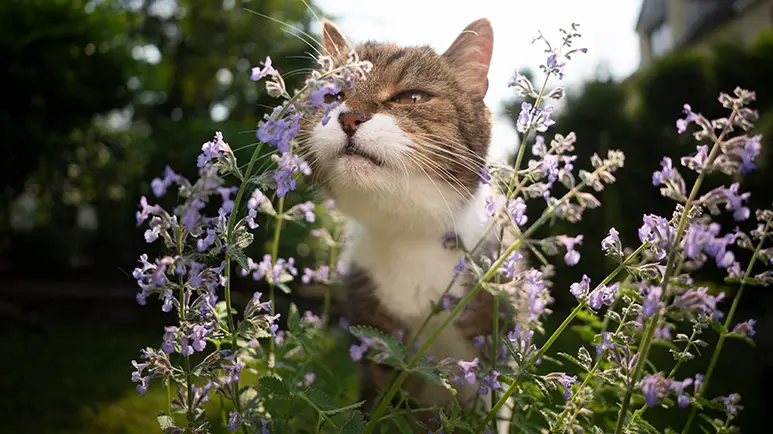Your Cat's Brain Under the Influence of Catnip
Kitties love their catnip and their owners get almost as much pleasure watching them romp, roll, and stumble. But what really happens when they're 'high?' Plus: How to use catnip to help bring lasting peace to a household of feuding felines.

STORY AT-A-GLANCE
- If you’re owned by a kitty who digs catnip, you’re familiar with the amazing reaction cats can have when presented with a bit of the herb. The chemical in catnip that causes your pet’s ecstatic behavior is nepetalactone, but as yet, we don’t know why it works – only that it certainly does work
- Cats under the influence of catnip perform a number of telltale behaviors, including sniffing and chewing the catnip container, drooling, shaking their heads, rolling around on the floor, repetitively kicking their hind legs, and walking around “drunk”
- According to veterinary behaviorist Dr. Nicholas Dodman, the behaviors kitties on catnip perform suggest the herb has an excitatory effect on areas of the brain that control appetite, and also predatory and sexual behavior
- Studies suggest the nepetalactone molecule has an opium-like action that stimulates opioid receptors in the brain
- Catnip is harmless and non-addictive for kitties, can help promote peace between feuding cats, and also has analgesic properties that may help cats with painful conditions, similar to the way marijuana relieves discomfort for some people
Editor's Note: This article is a reprint. It was originally published November 01, 2014.
Believe it or not, scientists have yet to discover why catnip drives kitties wild. They've identified the chemical substance in catnip that causes the effect – it's called nepetalactone, an organic compound. But we still don't know why it works. We just know that when it works, it REALLY works!
According to Dr. Nicholas Dodman, a veterinary behaviorist who runs the Behavior Clinic at Tufts Cummings School of Veterinary Medicine, writing for PetPlace.com, "A cat reacts to catnip with ecstasy and unbounded joy."
Behaviors people have witnessed after offering catnip to their pet include nosing, chewing, and batting the catnip container while drooling buckets; shaking their heads; rolling around and rubbing their bodies on the floor; losing their balance, falling and stumbling around; repetitively kicking their hind legs; and showing excitement and chasing behavior.
Catnip Affects Hunger, and Predatory and Sexual Behavior
Dr. Dodman offers a few possible explanations for feline behavior while under the influence of catnip. He believes that since some of the behaviors are playful in nature, catnip puts kitties in the mood to have fun.
Chewing and drooling seem to be associated with getting food, while rolling and rubbing appear to be sexual behaviors. Tandem hind leg kicking could be a predatory behavior, as is chasing.
It seems catnip may inspire bursts of expression of several natural feline behaviors, almost as if the kitty has let go of his inhibitions. (How many of us are more willing to hit the dance floor after a pre-boogie cocktail or two?)
According to Dr. Dodman, "This implies a general excitatory effect on areas of the brain, particularly those centered in and around the hypothalamus, the region that controls appetitive, predatory and sexual behavior."
Catnip May Help With Feuding Felines
Recent research suggests that not only does the nepetalactone molecule have an opioid shape, it also has an opium-like action, meaning it stimulates opioid receptors in the brain in the same way morphine does. Dr. Dodman believes the reason a benign herb like catnip contains such a powerful substance may be to attract insects that will subsequently assist in cross-pollination and other activities beneficial to plants.
When a susceptible kitty gets hold of catnip and absorbs the nepetalactone, her pleasure centers (opioid receptors) in the brain are activated and the next thing you know, she's rolling around in a state of goofy bliss.
Despite the fact that catnip appears to make susceptible kitties "high," it is an entirely harmless and non-addictive herb. It may even help in certain situations, for example, with battling cats. Kitties who don't get along may see their nemesis in a new and friendlier light while under the influence of catnip – and the truce has been known to hold after the effects of the nepetalactone wear off.
In addition, catnip has pain-relieving properties that may be helpful for some kitties, similar to the effects of marijuana in some people.
Sources and References
- PetPlace.com











